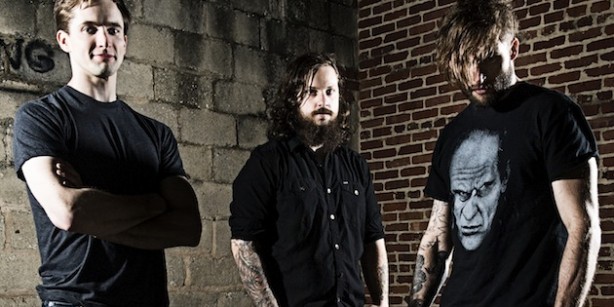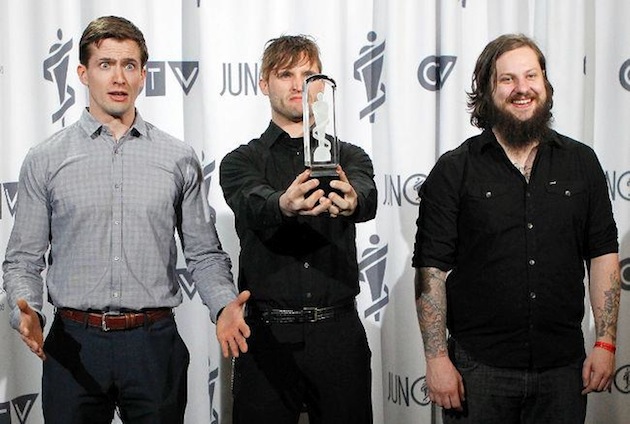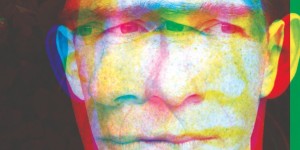 Music
Music
Q & A: KEN mode's Jesse Matthewson
by Tyler Munro
April 23, 2013
KEN mode’s rise to prominence has been anything but steady. Helmed by brothers Shane (drums) and Jesse Matthewson (guitar/vocals), they officially broke out of isolated Winnipeg and through the heavy music stratosphere after more than a decade of hard work with 2011’s Venerable. The album won the inaugural Heavy Metal/Hard Music Album of the Year prize at the 2012 Juno Awards and sparked a successful, if seemingly unending, series of tours. But even then, they searched for the consistency—and eventually found it, with the addition of Andrew LaCour, their sixth bassist in almost as many years and a mainstay in the songwriting process of their new album. Entrench is more than a follow-up—with its variations on the noise-soaked theme the band’s become known for, it might be their best yet. We rescued Jesse from pre-tour van-packing duties to see how it all came together, including how two accountants wrote an album powerful enough to get them on the road in the heat of tax season.
AUX: Where are you headed first?
Jesse Matthewson: We’re headed to Sioux Falls, South Dakota first.
Have you played with Today is the Day before?
Nope. Never. I’ve never even seen them before.
Really? They’ve always struck me as a likely influence. They were doing some similar things to you a bit earlier.
Most definitely. Their Willpower album is like a desert island record for me, so it’ll be cool actually getting to see them for the first time.
Is that just the product of being out in Winnipeg, where not a lot of bands get through?
They’ve never been to Winnipeg, and even Minneapolis they really haven’t been there very much, and that’s usually the go-to spot for a lot of people from Winnipeg to get to see bands that don’t come up to western Canada. But it seems as though a lot of things have been changing over the past bunch of years and more and more bands are coming through western Canada, which I guess people can’t complain about because you get to see some cool music that you never would have before.
There’s been solid stuff coming out of Winnipeg, too, so it’s kind of surprising that more bands don’t make it through the city.
It’s probably the fact that we have under a million people and that every drive is like 8-to-10 hours from Winnipeg. It hurts people wanting to come through a lot of the time.
So you’ve called Entrench your most collaborative effort yet. Can you elaborate on that?
Basically we’ve been through six bassists in the past, like, 13 years. But more accurately, since 2005, we’ve been through six different people. A lot of the past two records have primarily been my own ideas that have been the base of the songs we’ve been writing, and on this record, with Andrew LaCour in the band, he’s really the first bassist since our original bassist Darryl Laxdal to be a major contributor to at least writing riffs for the band. A lot of the songs are based off of parts that he brought to the table, so it was very much a collaborative effort where everyone was contributing rather than largely my own.
I remember when you announced he had joined officially, it was spring or summer 2011, and you said you had already had some chunks of songs in the works. Did the writing start right away with Andrew?
He started touring with us in July of 2011, and we started writing with him in December when we had some time off. The album we put together was largely done in two short chunks, once in December 2011 and once in May 2012. That’s when we wrote the bulk of all the ideas that came to be Entrench. It really was about three weeks’ worth of hard writing and that’s about it, other than the little bit of time spent before we recorded the album, when we kind of fine-tuned some of the ideas. It was surprising how quickly and easily things came together while working with him. Venerable we wrote largely over the course of about two and a half years when we were in town, working full-time jobs. When Venerable came out we started touring full time, thus how we fit in the writing sessions for this new album. We kind of placed it between tours when we weren’t going to be out the whole time.
I know this is your first for Season of Mist. How do you record when your label situation your distribution situation is still up in the air?
Since we’ve been doing this for so long, and we’ve never really depended on a label to get the wheels in motion for that sort of thing. We knew we were going to be putting out a record and it didn’t really matter who was going to be putting it out, so we just went ahead it on our own. I applied for all of the various loan programs in Canada that we were going to be trying to get money from, so we knew that we were going to be covered regardless, it was just a matter of finding the right label to take the album’s promotion and distribution to the next level.
They’re a French label, too, so did you come to them or did they come to you?
I think we came to them, at least originally. They were kind of surprised in terms of the fit; they didn’t think that they’d be a label that we’d ever really be interested in working with, which is kind of funny, because the guy who is running their U.S. operations now is Gordon Conrad, who used to run Escape Artist records. He put out our first two records back in the early to mid-2000s. It’s been somewhat of a reuniting with our roots.
How do you peg yourselves? I see you labeled as noise rock and hardcore and sludge and everything in between, and they all kind of fit in their own parts.
That’s the thing, we see ourselves as all of those things, all combined. If I have to give one term, I’ll tend to gravitate more toward blending hardcore and noise rock together just because those are our primary influences, but as you’ve pointed out, there’s a lot of other stuff going on. I think that’s one of the reasons that, for the large part, we’ve never really caught on with a lot of audiences because people don’t know what to make of us. We will bring out a really slow song and then all of a sudden it’s a faster song. For some reason bands like Converge can pull that off because they’re labeled as a “hardcore band” or whatever, but because people like to call us noise rock I don’t think they know what to do with it.
You mentioned applying for Canadian grants and loans. Did winning the Juno last year help you?
I think it was a major contributor to us getting anything [laughs].
You were in a solid class of nominees.
It will be interesting to see how the award unfolds going forward. I know this year is a little less diverse in the approach that they’ve selected, but there’s a lot of really cool stuff coming out in 2013 so I’m really hopeful for what the 2014 lineup will look like.

Going back to the album, you’ve played around with ambience and instrumentals, but where do songs like “Monomyth” and “Romeo Must Never Know” come from?
“Romeo Must Never Know” is something that I’d been wanting to do for quite a while, we just never really had the time or resources to execute it the way that I wanted to. This time it just worked out really well. “Monomyth” itself, the idea changed a few times before we recorded it. For the most part we kind of changed the entire approach right as we were entering the studio. Andrew orchestrated all the strings on his computer and then we printed out sheet music and hired a string quartet and it just kind of came together, which was really cool. I’d been wanting to do stuff like that on an album for quite a while, but we never really had the time nor the cash to do so.
So that’s Andrew’s influence coming in again?
At least with the strings, yeah. I wrote the guitar and piano lines in that song, so we had the bare structure of it going in, but he put together the strings which turned out really, really cool.
You’ve said “Secret Vasectomy” was the first song you had and that you wrote around the title, but… how do you write a song around a title like that?
The funny thing is, we come up with a lot of different titles that I just keep as a memo on my phone, and a lot of the time when we’re coming up with the songs themselves and when I have lyrics, I’ll take that chunk of lyrics and try to relate it to one of the titles that’s on a list of things. Whatever actually works I’ll end up rolling with, and that one just, I felt, kind of worked. Well, all of the song names in use work with the lyrics in a very strange way, which I have fun with. I don’t usually like to explain myself, either, which I also have a lot of fun with.
Do you at least have vocal patterns in mind going in?
No, I write the songs themselves completely as a chunk of poetry and then I try to fit it to the music as though I was just a solo singer.
You’re heading off on a steady stream of tour dates. How do you keep occupied on the road?
A lot of driving. We have a lot of various band things we have to do on this tour, because obviously the album is coming out this month, so there’s going to be a lot of promotional things. We also do a lot of our own inventory management and what not, so we’re surprisingly busy a lot of the time when we’re on tour. Especially because Shane and I are both accountants—Shane’s a chartered accountant—so we like to keep on top of our business game.
Two accountants picked one hell of a time to go on tour. What’s the status of the music video you guys were working on?
The filming is finished. The editing I guess will be taking place while we’re gone, and then it should be ready to go hopefully by the time the album is out.

This article originally appeared in the April 2013 Issue of AUX Magazine.
Download and subscribe for free in the app store.
Tags: Music, Cancon, Interviews, AUX Magazine, jesse matthewson, KEN Mode





